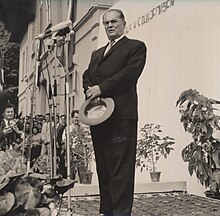ผู้ใช้:Noobythailand/ร่างบทความ

ยอซีป บรอซ (7 พฤษภาคม 1892 – 4 พฤษภาคม 1980), มักเป็นที่รู้จักกันว่า ตีโต, เป็นนักปฏิวัติลัทธิคอมมิวนิสต์และรัฐบุรุษชาวยูโกสลาฟ ทำหน้าที่ในบทบาทต่าง ๆ ตั้งแต่ปี ค.ศ. 1943 จนถึงแก่อสัญกรรมในปี ค.ศ. 1980 ในช่วงสงครามโลกครั้งที่สอง เขาเป็นผู้นำพลพรรคยูโกสลาเวีย มักจะถือว่าเป็นขบวนการต่อต้านที่มีประสิทธิภาพมากในทวีปยุโรปที่ถูกยึดครอง[1] เขายังทำหน้าที่เป็นประธานาธิบดีแห่งสหพันธ์สาธารณรัฐสังคมนิยมยูโกสลาเวีย ตั้งแต่วันที่ 14 มกราคม ปี ค.ศ. 1953 ถึง วันที่ 4 พฤษภาคม ค.ศ. 1980
คำคม
[แก้ไข]คำพูด
[แก้ไข]- No country of people's democracy has so many nationalities as this country has. Only in Czechoslovakia do there exist two kindred nationalities, while in some of the other countries there are only minorities. Consequently in these countries of people's democracy there has been no need to settle such serious problems as we have had to settle here. With them the road to socialism is less complicated than is the case here. With them the basic factor is the class issue, with us it is both the nationalities and the class issue. The reason why we were able to settle the nationalities question so thoroughly is to be found in the fact that it had begun to be settled in a revolutionary way in the course of the Liberation War, in which all the nationalities in the country participated, in which every national group made its contribution to the general effort of liberation from the occupier according to its capabilities. Neither the Macedonians nor any other national group which until then had been oppressed obtained their national liberation by decree. They fought for their national liberation with rifle in hand. The role of the Communist Party lay in the first place in the fact that it led that struggle, which was a guarantee that after the war the national question would be settled decisively in the way the communists had conceived long before the war and during the war. The role of the Communist Party in this respect today, in the phase of building socialism, lies in making the positive national factors a stimulus to, not a brake on, the development of socialism in our country. The role of the Communist Party today lies in the necessity for keeping a sharp lookout to see that national chauvinism does not appear and develop among any of the nationalities. The Communist Party must always endeavour, and does endeavour, to ensure that all the negative phenomena of nationalism disappear and that people are educated in the spirit of internationalism.
What are the phenomena of nationalism? Here are some of them: 1) National egoism, from which many other negative traits of nationalism are derived, as for example — a desire for foreign conquest, a desire to oppress other nations, a desire to impose economic exploitation upon other nations, and so on; 2) national-chauvinism which is also a source of many other negative traits of nationalism, as for example national hatred, the disparagement of other nations, the disparagement of their history, culture, and scientific activities and scientific achievements, and so on, the glorification of developments in their own history that were negative and which from our Marxist point of view are considered negative.
And what are these negative things? Wars of conquest are negative, the subjugation and oppression of other nations is negative, economic exploitation is negative, colonial enslavement is negative, and so on. All these things are accounted negative by Marxism and condemned. All these phenomena of the past can, it is true, be explained, but from our point of view they can never be justified.
In a socialist society such phenomena must and will disappear. In the old Yugoslavia national oppression by the great-Serb capitalist clique meant strengthening the economic exploitation of the oppressed peoples. This is the inevitable fate of all who suffer from national oppression. In the new, socialist Yugoslavia the existing equality of rights for all nationalities has made it impossible for one national group to impose economic exploitation upon another. That is because hegemony of one national group over another no longer exists in this country. Any such hegemony must inevitably bring with it, to some degree or other, in one form or another, economic exploitation; and that would be contrary to the principles upon which socialism rests. Only economic, political, cultural, and universal equality of rights can make it possible for us to grow in strength in these tremendous endeavours of our community.
- Concerning the National Question and Social Patriotism Speech held at the Slovene Academy of Arts and Sciences, November 26, 1948, Ljubljana
- ↑ Rhodri Jeffreys-Jones (13 June 2013). In Spies We Trust: The Story of Western Intelligence. OUP Oxford. p. 87. ISBN 978-0-19-958097-2.
